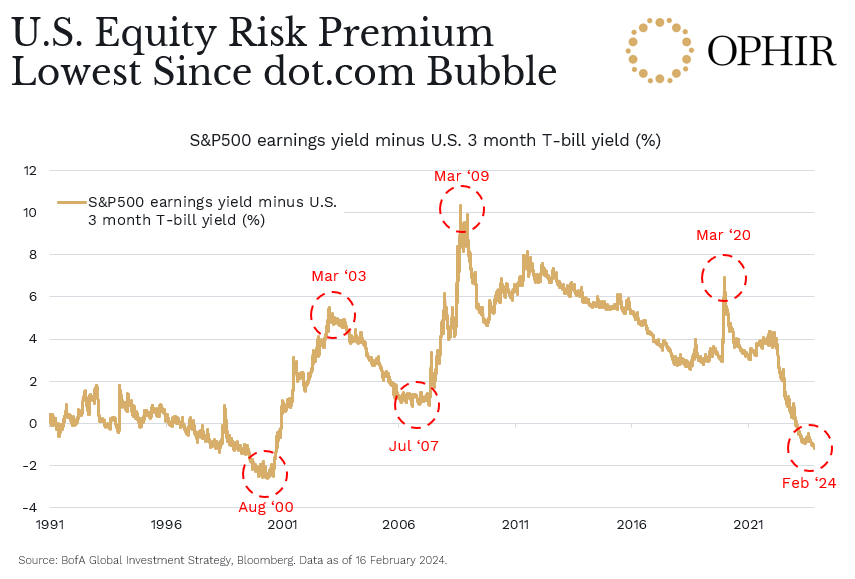S&P 500 – all risk and no reward?
As a young fund manager I got an email on a Friday afternoon from the top portfolio manager at my previous firm.
It was sent to the whole team and simply said ‘Hope for the best, but always prepare for the worst’.
I haven’t forgotten it.
And I think about it now everyone is getting super bullish on the share market, convinced we will avoid a recession in the U.S.
The reality is we aren’t out of the woods. With the U.K. and Japan now in technical recession, and no exact clear path when interest rates will come down in the U.S., recession risk there remains alive after the fastest hiking cycle in over 40 years (Bloomberg survey of economists still puts the median recession probability at 45% over the next year).
While the Ophir portfolios have become incrementally more bullish as the soft landing probability has increased in the U.S. over the last few months, we have a fire drill for what to do if the economy starts slowing fast.
One of the key indicators that keeps us concerned about share market complacency is the U.S. Equity Risk Premium (ERP).

The chart shows the ERP has not been this low since the dot-com bubble, 23 years ago.
The ERP is the excess return the share market gives over a risk free investment (short term interest rates). The lower, the less the share market rewards you compared to money ‘in the bank’.
Right now the ERP is in negative territory, well below its 2.7% average since the early 1990s. It has taken recessions in ‘01, ‘08 and ‘20 for the ERP to revert back above its average.
What is causing a negative ERP? Is it expensive S&P valuations/low earnings yield, or high interest rates?
It’s a little from column A and a little from column B.
In column A: The current S&P500 earnings yield is 4.2%, below the long-term average of 5.2%. Rich valuations for the S&P500, in large part due to decades high market concentration at the top of the S&P500 in high valuation/growth technology companies has pushed the earnings yield below average.
In column B: Fed rate hikes have taken short term interest rates to 5.3-5.5%, a level that has really only been eclipsed in 1995 and 2000 (since the early 1990s).
The combination of high rates and high S&P500 valuations are providing scant reward, at least historically, for U.S. large cap investors.
Incidentally, the last time we had a 4.2% S&P500 earnings yield and 5.3-5.5% short term interest rates was February 1998.
The ERP stayed negative for a long time then. It took the 2001 recession and collapsing of the Dot.com bubble for sanity to prevail and the ERP to return to positive territory in February 2001.
Today, basically U.S. large caps are not pricing in any chance of recession and that should scare investors.
While ‘the trend is your friend’ currently, it’s important to challenge the status quo and direction of the herd.
The ERP is something investors shouldn’t ignore.
2 topics

